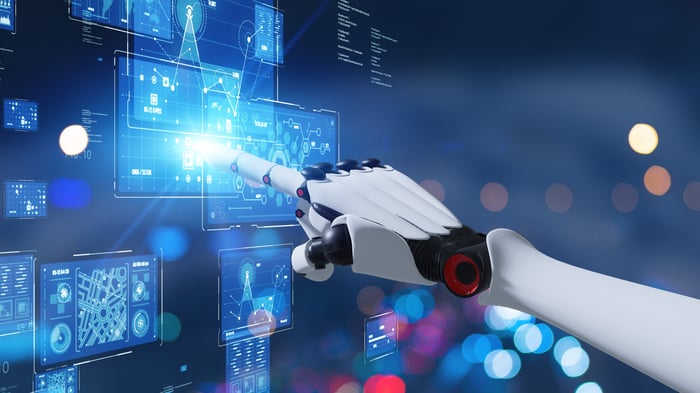There's no denying that 2023 will likely go down in history as the year artificial intelligence (AI) came of age. The latest advancements in AI have given rise to generative AI, which can create original content from scratch. The next-generation technology can draft email responses, search and summarize online data, and even write and review computer code, and it could potentially revolutionize many facets of business.
A quick review of the headlines makes it clear that AI has gone viral, but some on Wall Street are sounding the warning bell, suggesting that while the technology is transformative, it may take years to play out.
That's the position taken by Ken Griffin, billionaire CEO and founder of hedge fund Citadel Advisors -- and he believes investors should proceed with caution.

Image source: Getty Images.
Who is Ken Griffin?
Ken Griffin is arguably one of the most successful figures on Wall Street. He might be best known for predicting the 1987 stock market crash, yet he continues adding to his long list of credentials today.
Last year, Griffin cemented his status as a hedge fund legend. Amid the worst downturn in over a decade, he navigated Citadel Advisors through the crisis, notching the biggest windfall in hedge fund history, delivering returns of $16 billion in 2022.
With a resume like that, his opinion carries plenty of weight in the financial district.
A stark warning
Griffin chided those in the AI space for whipping people into a frenzy. "I do think the AI community is making a terrible mistake by being full of hype on the near-term implications of generative AI," he said. "I think they're actually doing everybody a huge disservice with the level of hype they are creating."
It's easy to understand where Griffin is coming from, though the enthusiasm surrounding AI varies.
- Tesla CEO Elon Musk equates the technology with the science fiction movie The Terminator and fears it could bring on the apocalypse.
- Fellow billionaire Daniel Loeb says it's a "transformational technology platform shift ... seen roughly once per decade," comparing it to the advent of the personal computer, internet, mobile phones, and cloud computing.
- Veteran Wedbush analyst Dan Ives says AI will spark the "fourth industrial revolution."
Given the polarizing nature of the technology, it stands to reason that there might be some hyperbole involved. That said, a quick look at Griffin's portfolio shows that while he thinks the hype has gotten ahead of the technology, he's not averse to holding AI stocks. In fact, Citadel's two largest positions are AI stocks.
You can't spell Nvidia without "AI"
Nvidia (NVDA 1.28%) has been one of the biggest beneficiaries of AI's coming out party this year and is one of Griffin's largest holdings. To close out the first quarter (the most recent data available), the billionaire owned roughly 3 million Nvidia shares in a stake currently valued at $1.25 billion.
Years ago, researchers discovered that graphics processing units (GPUs), which are highly adept at creating lifelike images in video games, also provided the computational horsepower necessary to build and run AI systems.
Nvidia still has a sizable book of business in the gaming industry and is a staple in the data center and cloud infrastructure spaces -- which is likely why Griffin bought shares of the chipmaker. The potential upside from AI is merely the icing on the cake.
Meta excited about Meta
Griffin holds an equally sizable stake in Meta Platforms (META 0.73%). At the end of the first quarter, Citadel owned roughly 3.9 million Meta shares, in a stake worth $1.2 billion.
Meta has long used AI to surface relevant content for users of its social media sites. Furthermore, as one of the world's largest digital advertisers, Meta uses AI to ensure its ads reach their target market.
Just months ago, Meta was reeling from the slump in ad spending that typically accompanies macroeconomic headwinds. The company appears to be on the verge of a turnaround, as history shows that when a recovery begins, the marketing spigots are turned back on, and the advertising dollars start to flow again.
Griffin likely viewed this as an opportunity that was simply too good to pass up. AI was just a delightful bonus.
Reconciling these seemingly contradictory facts
It isn't a stretch to imagine that Griffin believes that the fervor around AI has reached epic proportions while simultaneously believing in the future prospects of both Nvidia and Meta Platforms. Each company has a foundational business with strong potential growth. Each also stands to benefit from advances in AI.
I'm on record as a bull for both Nvidia and Meta Platforms. Still, there's a caveat: The stocks have gained 190% and 154%, respectively, so far this year (as of this writing), which makes them susceptible to sharp declines if investors experience a sudden loss of confidence. As such, each stock is best held for the long term.





